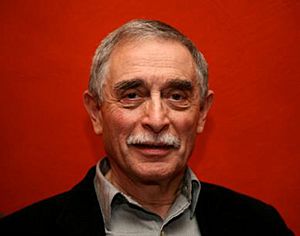Peter Liss facts for kids
Quick facts for kids
Peter Liss
|
|
|---|---|
 |
|
| Born | 27 October 1942 |
| Nationality | British |
| Alma mater | University College, Durham University of Wales |
| Awards | FRS (2008) |
| Scientific career | |
| Fields | Environmental Science |
| Institutions | University of East Anglia |
Peter Simon Liss, born on October 27, 1942, is a very important British scientist. He studies the environment, especially how oceans and the air interact. He works as a special professor at the University of East Anglia. He has also received high honors for his work, like being a Commander of the Order of the British Empire (CBE) and a Fellow of the Royal Society (FRS).
Peter Liss: His Early Life and Studies
Peter Liss went to Durham University to start his higher education. There, he earned his first university degree, a Bachelor of Science (BSc). After that, he continued his studies at the University of Wales. At the University of Wales, he completed his advanced degree, which is called a PhD.
Peter Liss's Work as a Scientist
Peter Liss is a leading expert in environmental science. His research focuses on the chemistry of the atmosphere and the oceans. He wants to understand how gases and other substances move between the sea and the air. This work helps us learn more about our planet's climate and pollution.
He is part of a special group called the Laboratory for Global Marine and Atmospheric Chemistry (LGMAC). This group studies how the world's oceans and atmosphere work together. He is also a member of the Solar Radiation Working Group. This group looks at how sunlight affects our planet.
Awards and Special Recognition
Peter Liss has received many important awards for his scientific work. In the year 2000, he was given the Challenger Society Medal. This award recognizes excellent research in oceanography.
Later, in 2003 or 2004, he received the John Jeyes Medal. This medal comes from the Royal Society of Chemistry. It is given to scientists who have made great contributions to environmental chemistry. In 2008, he became a Fellow of the Royal Society (FRS). This is a very high honor for scientists in the United Kingdom.
 | Janet Taylor Pickett |
 | Synthia Saint James |
 | Howardena Pindell |
 | Faith Ringgold |

